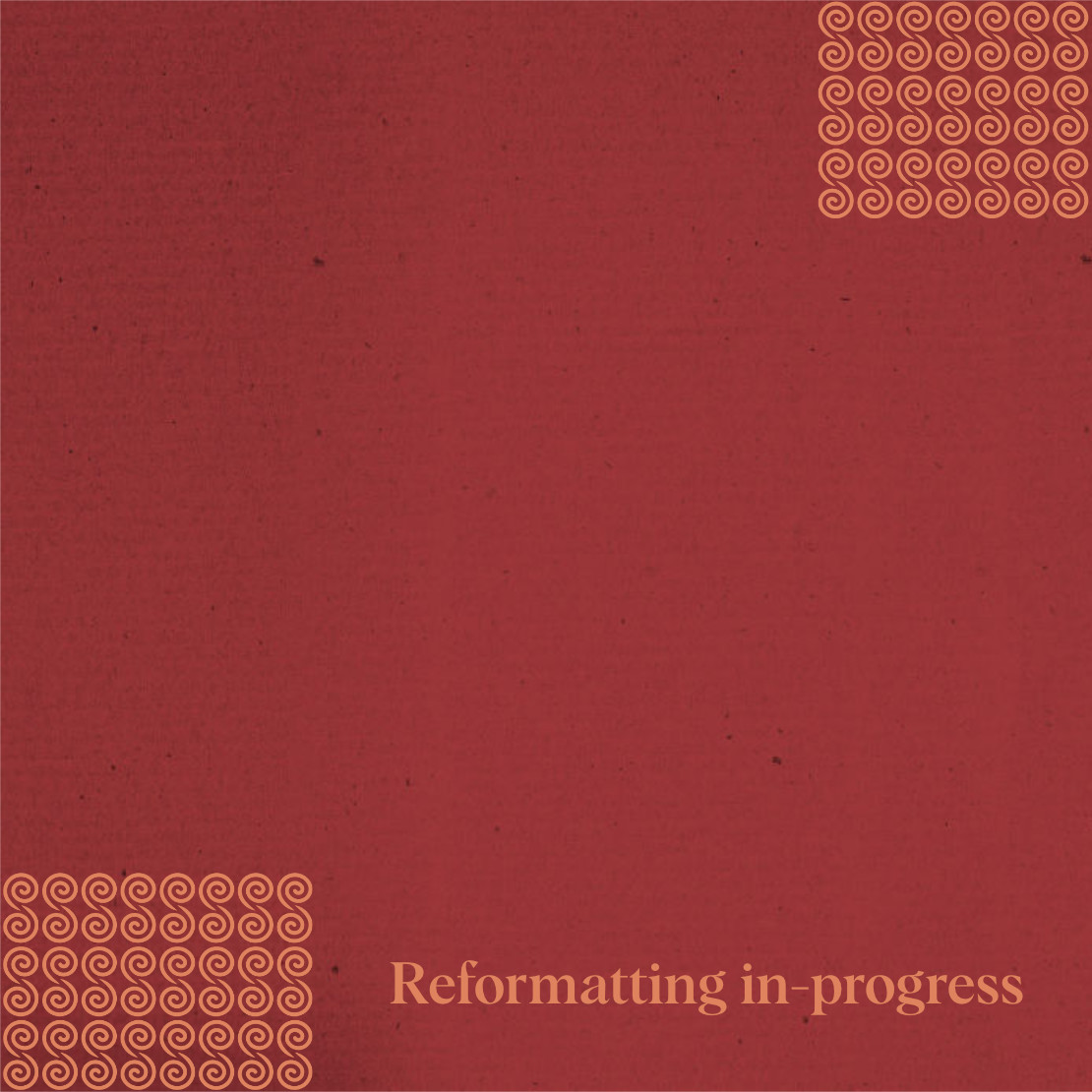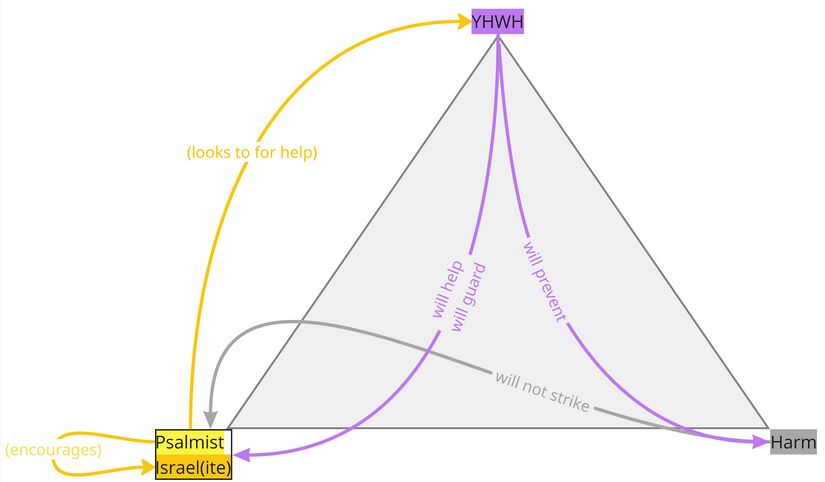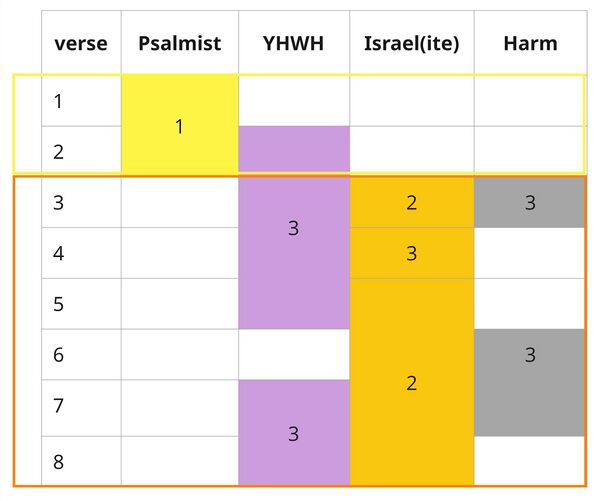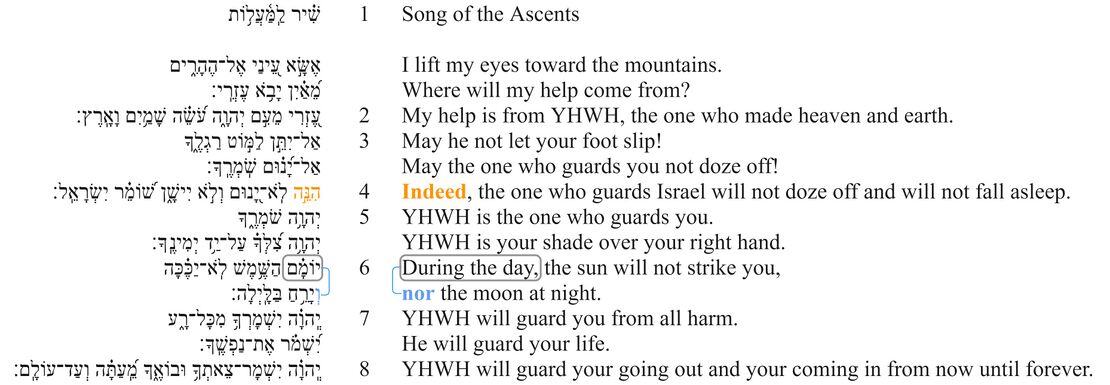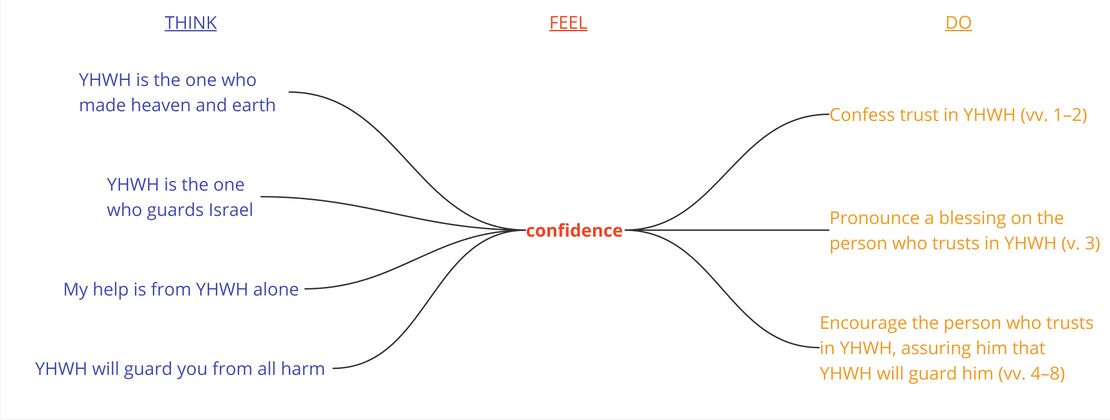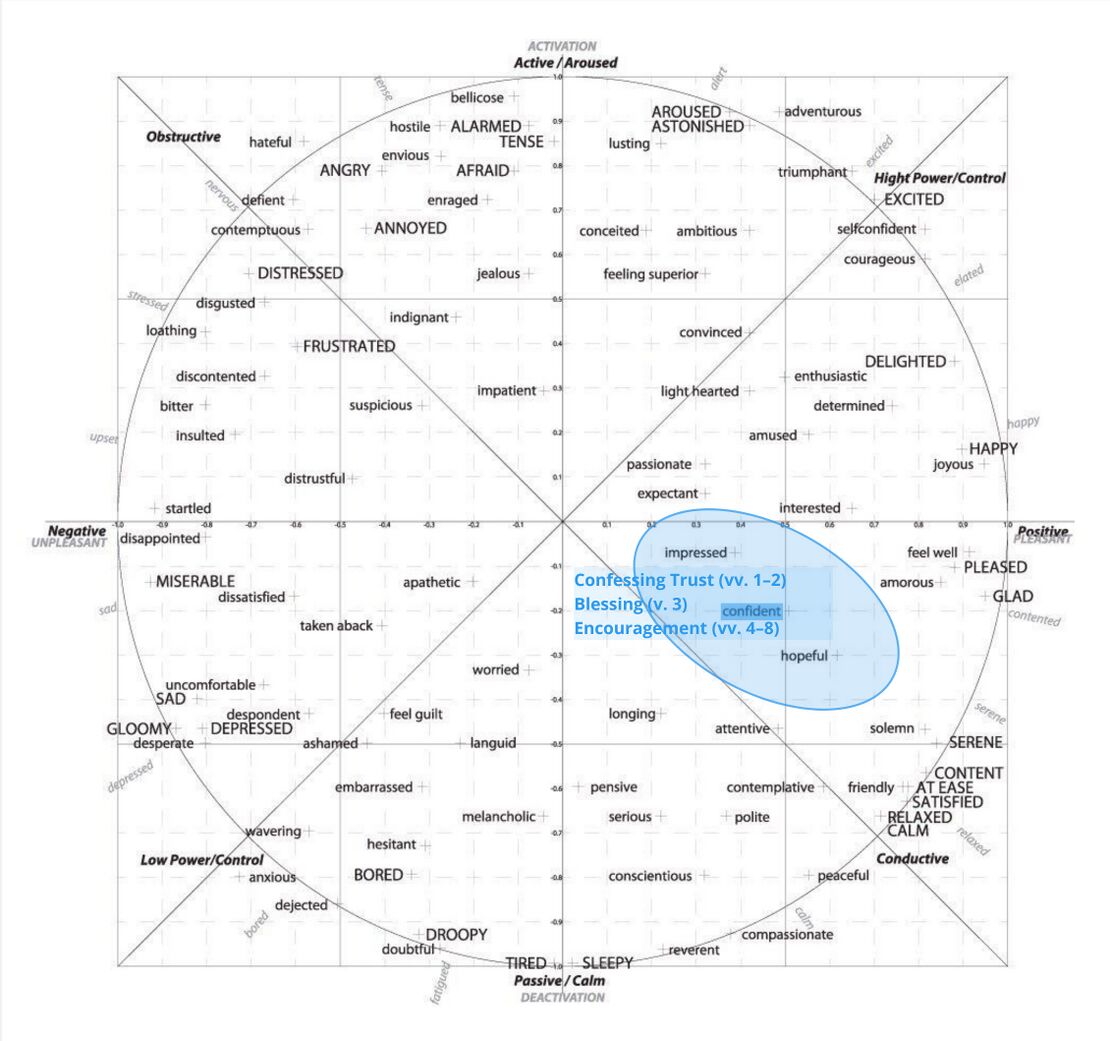Psalm 121 Discourse
About the Discourse Layer
Our Discourse Layer includes four additional layers of analysis:
- Participant analysis
- Macrosyntax
- Speech act analysis
- Emotional analysis
For more information on our method of analysis, click the expandable explanation button at the beginning of each layer.
Participant Analysis
Participant Analysis focuses on the characters in the psalm and asks, “Who are the main participants (or characters) in this psalm, and what are they saying or doing? It is often helpful for understanding literary structure, speaker identification, etc.
For a detailed explanation of our method, see the Participant Analysis Creator Guidelines.
There are 4 participants/characters in Psalm 121:
Profile List
| Psalmist |
| YHWH |
| "YHWH" (vv. 2, 5ab, 7, 8) |
| "The one who made heaven and eart" (v. 2) |
| "The one who guards you" (vv. 3, 5) |
| "The one who guards Israel" (v. 4) |
| "Your shade" (v. 5) |
| Israel(ite) |
| "Israel" (v. 4) |
| Harm |
| "slip" (lit.: "the slipping") (v. 3) |
| "the sun" (v. 6) |
| "the moon" (v. 6) |
| "harm" (v. 7) |
Profile Notes
- The psalmist is an anonymous Israelite who looks to YHWH for help and encourages other Israelites to do the same.
- The interchange between "the one who guards you" (vv. 3b, 5a) and "the one who guards Israel" (v. 4) suggests that the second-person singular addressee is Israel, or an individual Israelite representing the whole people.[1] The use of the singular instead of the plural emphasizes YHWH's protection is for each and every Israelite.
- The "antagonist" slot in this psalm is filled by all of those things that might threaten an Israelite's well-being (specifically, on his pilgrim journey to Jerusalem): "slipping" (v. 3), "sun" and "moon" (v. 6), and "all harm" (v. 7). The first reference to harm is earthly (v. 3), the second is heavenly (v. 6), and the third is all encompassing (v. 7).
- YHWH is both "the one who guards you / the one who guards Israel" (vv. 3–5) and "the one who made heaven and earth" (v. 2). As the creator of the universe, he is able to guard his people from all harm, whether earthly or heavenly.
| Hebrew | Line | English |
|---|---|---|
| שִׁ֗יר לַֽמַּ֫עֲל֥וֹת | 1a | Song of the Ascents |
| אֶשָּׂ֣א עֵ֭ינַי אֶל־הֶהָרִ֑ים | 1b | I lift my eyes toward the mountains. |
| מֵ֝אַ֗יִן יָבֹ֥א עֶזְרִֽי׃ | 1c | Where will my help come from? |
| עֶ֭זְרִי מֵעִ֣ם יְהוָ֑ה | 2a | My help is from YHWH, |
| עֹ֝שֵׂ֗ה שָׁמַ֥יִם וָאָֽרֶץ׃ | 2b | the one who made heaven and earth. |
| אַל־יִתֵּ֣ן לַמּ֣וֹט רַגְלֶ֑ךָ | 3a | May he not let your foot slip! |
| אַל־יָ֝נ֗וּם שֹֽׁמְרֶֽךָ׃ | 3b | May the one who guards you not doze off! |
| הִנֵּ֣ה לֹֽא־יָ֭נוּם וְלֹ֣א יִישָׁ֑ן | 4a | Indeed, the one who guards Israel will not doze off and will not fall asleep. |
| שׁ֝וֹמֵ֗ר יִשְׂרָאֵֽל׃ | 4b | the one who guards Israel |
| יְהוָ֥ה שֹׁמְרֶ֑ךָ | 5a | YHWH is the one who guards you. |
| יְהוָ֥ה צִ֝לְּךָ֗ עַל־יַ֥ד יְמִינֶֽךָ׃ | 5b | YHWH is your shade over your right hand. |
| יוֹמָ֗ם הַשֶּׁ֥מֶשׁ לֹֽא־יַכֶּ֗כָּה | 6a | During the day, the sun will not strike you, |
| וְיָרֵ֥חַ בַּלָּֽיְלָה׃ | 6b | nor the moon at night. |
| יְֽהוָ֗ה יִשְׁמָרְךָ֥ מִכָּל־רָ֑ע | 7a | YHWH will guard you from all harm. |
| יִ֝שְׁמֹ֗ר אֶת־נַפְשֶֽׁךָ׃ | 7b | He will guard your life. |
| יְֽהוָ֗ה יִשְׁמָר־צֵאתְךָ֥ וּבוֹאֶ֑ךָ | 8a | YHWH will guard your going out and your coming in |
| מֵֽ֝עַתָּ֗ה וְעַד־עוֹלָֽם׃ | 8b | from now until forever. |
- The speech situation in Psalm 121 is unclear. Scholars debate about the number of speakers, the points at which speaker-shifts occur, and the identity of the addressee(s). For a more detailed discussion of some of the issues, The Voice(s) in Psalm 121. In short, we argue that there is one speaker throughout the whole psalm. The shift to second-person singular in vv. 3–8 is a rhetorical device.
- The interchange between "the one who guards you" (vv. 3b, 5a) and "the one who guards Israel" (v. 4) suggests that the second-person singular addressee is Israel, or an individual Israelite representing the whole people.[2] The use of the singular instead of the plural emphasizes YHWH's protection is for each and every Israelite.
- The use of second-person singular forms to address a group is a common rhetorical device in the Hebrew Bible. The Ten Commandments are expressed as second-person singular commands, because they apply to each and every individual.[3] Similarly, the Book of Deuteronomy alternates between second-person singular and second-person plural. De Regt argues that these shifts correlate with the content: "When Israel is addressed about its history... the address forms tend to be plural. But when the subject matter is cultic or ritual (particularly when the commandments are detailed), most of the address forms are singular."[4]
Participant Relations Diagram
The relationships among the participants may be abstracted and summarized as follows:
Macrosyntax
Macrosyntax Diagram
| Macrosyntax legend | |
|---|---|
| Vocatives | Vocatives are indicated by purple text. |
| Discourse marker | Discourse markers (such as כִּי, הִנֵּה, לָכֵן) are indicated by orange text. |
| The scope governed by the discourse marker is indicated by a dashed orange bracket connecting the discourse marker to its scope. | |
| The preceding discourse grounding the discourse marker is indicated by a solid orange bracket encompassing the relevant clauses. | |
| Subordinating conjunction | The subordinating conjunction is indicated by teal text. |
| Subordination is indicated by a solid teal bracket connecting the subordinating conjunction with the clause to which it is subordinate. | |
| Coordinating conjunction | The coordinating conjunction is indicated by blue text. |
| Coordination is indicated by a solid blue line connecting the coordinating clauses. | |
| Coordination without an explicit conjunction is indicated by a dashed blue line connecting the coordinated clauses. | |
| Marked topic is indicated by a black dashed rounded rectangle around the marked words. | |
| The scope of the activated topic is indicated by a black dashed bracket encompassing the relevant clauses. | |
| Marked focus or thetic sentence | Marked focus (if one constituent) or thetic sentences[5] are indicated by bold text. |
| Frame setters[6] are indicated by a solid gray rounded rectangle around the marked words. | |
| [blank line] | Discourse discontinuity is indicated by a blank line. |
| [indentation] | Syntactic subordination is indicated by indentation. |
| Direct speech is indicated by a solid black rectangle surrounding all relevant clauses. | |
| (text to elucidate the meaning of the macrosyntactic structures) | Within the CBC, any text elucidating the meaning of macrosyntax is indicated in gray text inside parentheses. |
If an emendation or revocalization is preferred, that emendation or revocalization will be marked in the Hebrew text of all the visuals.
| Emendations/Revocalizations legend | |
|---|---|
| *Emended text* | Emended text, text in which the consonants differ from the consonants of the Masoretic text, is indicated by blue asterisks on either side of the emendation. |
| *Revocalized text* | Revocalized text, text in which only the vowels differ from the vowels of the Masoretic text, is indicated by purple asterisks on either side of the revocalization. |
- The macrosyntactic features observed at this layer do not suggest any particular division of the text into smaller units.
- v. 6.
- The non-default word order in v. 6 creates a chiasm:[7] A. "during the day"; B. "the sun"; C. "will not strike you"; B'. "the moon"; A'. "at night". Lunn argues that the word order in this verse might be marking a literary peak in the psalm.[8] Indeed, v. 6 further stands out as being the only verse in vv. 3–8 that does not have the word שׁמר. This word occurs three times before v. 6 and three times after it.
- In addition to creating a chiastic pattern, the fronted adverbial "during the day" could function as a frame-setter.
- vv. 7–8. The subject-predicate word order in vv. 7a, 8a matches the subject-predicate word order in v. 5. Note especially the similarity between יְהוָה שֹׁמְרֶךָ in v. 5a (the beginning of a poetic section) and יְהוָה יִשְׁמָרְךָ in v. 7a (the beginning of the next poetic section). Thus, the non-default subject-verb word order in vv. 7–8 is part of a poetic pattern. It might also be that the subject-verb word order in vv. 7–8 is necessary to mark these clauses as indicative (or assertive). Verb-subject word order might have implied directive (or projective) semantics : "May YHWH guard...".[9]
- v. 5. The verbless clauses in v. 5a and v. 5b each predicate something about YHWH: "YHWH (topic) is your guard, i.e., the one who guards you. YHWH is your shade..." Alternatively, it is plausible that the verbless clause in v. 5a is specificational (rather than predicational): "(Who is the one who guards you [see v. 3a]?) YHWH is the one who guards you" (cf. vv. 1–2).
- v. 4. The discourse marker indeed (הִנֵּה) at the beginning of v. 4 signals to the reader that the information in v. 4 is "noteworthy or newsworthy with respect to the other discourse active information."[10] Specifically, it signals that the content of v. 4 "modifies the content or implicatures of statements in the preceding cotext," providing either confirmation, elaboration, or a clarification.[11] The previous verse expressed a wish, or a blessing ("May he..."), with the implicit possibility that it might not come true. But v. 4 corrects this possible misunderstanding and affirms, without doubt, that YHWH will not doze off or fall asleep.
Speech Act Analysis
The Speech Act layer presents the text in terms of what it does, following the findings of Speech Act Theory. It builds on the recognition that there is more to communication than the exchange of propositions. Speech act analysis is particularly important when communicating cross-culturally, and lack of understanding can lead to serious misunderstandings, since the ways languages and cultures perform speech acts varies widely.
For a detailed explanation of our method, see the Speech Act Analysis Creator Guidelines.
Summary Visual
| Speaker | Verses | Macro Speech Acts | Addressee | |||||
|---|---|---|---|---|---|---|---|---|
| Psalmist | v. 1 Song of the Ascents I lift my eyes toward the mountains. Where will my help come from? | DECLARING TRUST (vv. 1–2) |
Israel(ite) | |||||
| v. 2 My help is from YHWH, the one who made heaven and earth. |
Who will I trust to help me? |
|||||||
| v. 3 May he not let your foot slip! May the one who guards you not doze off! | BLESSING (v. 3) |
|||||||
|
May YHWH never fail to guard you! |
||||||||
| v. 4 Indeed, the one who guards Israel will not doze off and will not fall asleep. | ENCOURAGEMENT (vv. 4–8) |
|||||||
| v. 5 YHWH is the one who guards you. YHWH is your shade over your right hand. |
YHWH will guard you from all harm. |
|||||||
| v. 6 During the day, the sun will not strike you, nor the moon at night. | ||||||||
| v. 7 YHWH will guard you from all harm. He will guard your life. | ||||||||
| v. 8 YHWH will guard your going out and your coming in from now until forever. | ||||||||
Speech Act Analysis Chart
The following chart is scrollable (left/right; up/down).
| Verse | Hebrew | CBC | Sentence type | Illocution (general) | Illocution with context | Macro speech act | Intended perlocution (Think) | Intended perlocution (Feel) | Intended perlocution (Do) |
| Verse number and poetic line | Hebrew text | English translation | Declarative, Imperative, or Interrogative Indirect Speech Act: Mismatch between sentence type and illocution type |
Assertive, Directive, Expressive, Commissive, or Declaratory Indirect Speech Act: Mismatch between sentence type and illocution type |
More specific illocution type with paraphrased context | Illocutionary intent (i.e. communicative purpose) of larger sections of discourse These align with the "Speech Act Summary" headings |
What the speaker intends for the address to think | What the speaker intends for the address to feel | What the speaker intends for the address to do |
If an emendation or revocalization is preferred, that emendation or revocalization will be marked in the Hebrew text of all the visuals.
| Emendations/Revocalizations legend | |
|---|---|
| *Emended text* | Emended text, text in which the consonants differ from the consonants of the Masoretic text, is indicated by blue asterisks on either side of the emendation. |
| *Revocalized text* | Revocalized text, text in which only the vowels differ from the vowels of the Masoretic text, is indicated by purple asterisks on either side of the revocalization. |
| Verse | Text (Hebrew) | Text (CBC) | Sentence type | Illocution (general) | Illocution with context | Macro speech act | Intended perlocution (Think) | Intended perlocution (Feel) | Intended perlocution (Do) | Speech Act Notes |
|---|---|---|---|---|---|---|---|---|---|---|
| 1 | שִׁ֗יר לַֽמַּ֫עֲל֥וֹת | Song of the Ascents | ||||||||
| אֶשָּׂ֣א עֵ֭ינַי אֶל־הֶהָרִ֑ים | I lift my eyes toward the mountains. | Declarative | Assertive | Describing what he is doing in the moment, i.e., lifting his eyes toward the mountains | Declaring trust in YHWH alone | Israel will recognize that YHWH is the one who made heaven and earth and that he alone can be trusted for help. | The listener will feel suspense at the psalmist's question. (To whom will the psalmist look for help? Will he look to other gods who are associated with "the mountains"?) | Israel will follow the psalmist's example of rejecting other gods and trusting in YHWH alone. | For more details on the rhetorical function of v. 1, see https://psalms.scriptura.org/w/The_Mountains_in_Ps_121:1. | |
| מֵ֝אַ֗יִן יָבֹ֥א עֶזְרִֽי׃ | Where will my help come from? | Interrogative | Expressive | Asking (rhetorically) where his help will come from; setting the stage for an affirmation of trust | For a rhetorical question with a similar effect, see Ps 4:7. | |||||
| 2 | עֶ֭זְרִי מֵעִ֣ם יְהוָ֑ה עֹ֝שֵׂ֗ה שָׁמַ֥יִם וָאָֽרֶץ׃ | My help is from YHWH, the one who made heaven and earth. | Declarative | Assertive | Answering his own question: affirming that his help is from YHWH and not from any other divine being | The listener will feel the resolution of the suspense. | ||||
| 3 | אַל־יִתֵּ֣ן לַמּ֣וֹט רַגְלֶ֑ךָ | May he not let your foot slip! | Imperative | Directive | Invoking YHWH to not let the Israelite's foot sliip | Blessing an Israelite by invoking YHWH's protection over him | The Israelite will recognize that YHWH guards him from all harm. | The Israelite will feel safe and secure under YHWH's protection. | The Israelite will trust in YHWH for protection. | The directives "may he not..." in v. 3 are best described as a "blessing" (ברכה): "causative action by which deities grant a special favor to humans, objects, or events, or by which humans invoke a deity to do the same" (SDBH; see further Aitken 2007). |
| אַל־יָ֝נ֗וּם שֹֽׁמְרֶֽךָ׃ | May the one who guards you not doze off! | Imperative | Directive | Invoking YHWH to not doze off | ||||||
| 4 | הִנֵּ֣ה לֹֽא־יָ֭נוּם וְלֹ֣א יִישָׁ֑ן שׁ֝וֹמֵ֗ר יִשְׂרָאֵֽל׃ | Indeed, the one who guards Israel will not doze off and will not fall asleep. | Declarative | Assertive | Denying the possibility of YHWH dozing off or falling asleep | Encouraging the Israelite that YHWH guards him | The rest of the psalm (vv. 4–8) consists of a series of affirmations and denials, the global purpose of which is encourage the addressee regarding YHWH's protection. | |||
| 5 | יְהוָ֥ה שֹׁמְרֶ֑ךָ | YHWH is the one who guards you. | Declarative | Assertive | Affirming that YHWH is the one who guards the Israelite | |||||
| יְהוָ֥ה צִ֝לְּךָ֗ עַל־יַ֥ד יְמִינֶֽךָ׃ | YHWH is your shade over your right hand. | Declarative | Assertive | Affirming that YHWH is the shade over the Israelite's right hand | ||||||
| 6 | יוֹמָ֗ם הַשֶּׁ֥מֶשׁ לֹֽא־יַכֶּ֗כָּה | During the day, the sun will not strike you, | Declarative | Assertive | Denying the possibility that the sun would strike the Israelite | |||||
| וְיָרֵ֥חַ בַּלָּֽיְלָה׃ | nor the moon at night. | Declarative | Assertive | Denying the possibility that the moon would strike the Israelite | ||||||
| 7 | יְֽהוָ֗ה יִשְׁמָרְךָ֥ מִכָּל־רָ֑ע | YHWH will guard you from all harm. | Declarative | Assertive | Affirming that YHWH will guard the Israelite from all harm | |||||
| יִ֝שְׁמֹ֗ר אֶת־נַפְשֶֽׁךָ׃ | He will guard your life. | Declarative | Assertive | Affirming that YHWH will protect the Israelite's life | ||||||
| 8 | יְֽהוָ֗ה יִשְׁמָר־צֵאתְךָ֥ וּבוֹאֶ֑ךָ מֵֽ֝עַתָּ֗ה וְעַד־עוֹלָֽם׃ | YHWH will guard your going out and your coming in from now until forever. | Declarative | Assertive | Affirming that YHWH will guard the Israelite in all things and at all times |
Emotional Analysis
This layer explores the emotional dimension of the biblical text and seeks to uncover the clues within the text itself that are part of the communicative intent of its author. The goal of this analysis is to chart the basic emotional tone and/or progression of the psalm.
For a detailed explanation of our method, see the Emotional Analysis Creator Guidelines.
Emotional Analysis Chart
If an emendation or revocalization is preferred, that emendation or revocalization will be marked in the Hebrew text of all the visuals.
| Emendations/Revocalizations legend | |
|---|---|
| *Emended text* | Emended text, text in which the consonants differ from the consonants of the Masoretic text, is indicated by blue asterisks on either side of the emendation. |
| *Revocalized text* | Revocalized text, text in which only the vowels differ from the vowels of the Masoretic text, is indicated by purple asterisks on either side of the revocalization. |
| Verse | Text (Hebrew) | Text (CBC) | The Psalmist Feels | Emotional Analysis Notes |
|---|---|---|---|---|
| 1 | שִׁ֗יר לַֽמַּ֫עֲל֥וֹת | Song of the Ascents | ||
| אֶשָּׂ֣א עֵ֭ינַי אֶל־הֶהָרִ֑ים | I lift my eyes toward the mountains. | • Confidence in YHWH, the one who made heaven and earth and the one who guards Israel | The phrase "lift one's eyes" implies confidence. SDBH: "literally: to lift up (one's) eyes (to); hence: = action by which humans turn to a deity or place with the confidence that they will find help and support there." On the one hand, the confidence implied by the phrase "lift my eyes" is only pretended, since the psalmist is not actually placing confidence in the divine beings in the mountains (https://psalms.scriptura.org/w/The_Mountains_in_Ps_121:1). On the other hand, the psalmist truly is confident, except his confidence is not in the "mountains" but in YHWH, the one who made heaven and earth. | |
| מֵ֝אַ֗יִן יָבֹ֥א עֶזְרִֽי׃ | Where will my help come from? | Some argue that the question in v. 1 implies anxiety (e.g., Fokkelman 2000, 271, Maré 2006). It is more likely, however, that the question is rhetorical, setting up the confident profession in v. 2. See https://psalms.scriptura.org/w/The_Mountains_in_Ps_121:1. | ||
| 2 | עֶ֭זְרִי מֵעִ֣ם יְהוָ֑ה עֹ֝שֵׂ֗ה שָׁמַ֥יִם וָאָֽרֶץ׃ | My help is from YHWH, the one who made heaven and earth. | ||
| 3 | אַל־יִתֵּ֣ן לַמּ֣וֹט רַגְלֶ֑ךָ | May he not let your foot slip! | ||
| אַל־יָ֝נ֗וּם שֹֽׁמְרֶֽךָ׃ | May the one who guards you not doze off! | |||
| 4 | הִנֵּ֣ה לֹֽא־יָ֭נוּם וְלֹ֣א יִישָׁ֑ן שׁ֝וֹמֵ֗ר יִשְׂרָאֵֽל׃ | Indeed, the one who guards Israel will not doze off and will not fall asleep. | ||
| 5 | יְהוָ֥ה שֹׁמְרֶ֑ךָ | YHWH is the one who guards you. | ||
| יְהוָ֥ה צִ֝לְּךָ֗ עַל־יַ֥ד יְמִינֶֽךָ׃ | YHWH is your shade over your right hand. | |||
| 6 | יוֹמָ֗ם הַשֶּׁ֥מֶשׁ לֹֽא־יַכֶּ֗כָּה | During the day, the sun will not strike you, | ||
| וְיָרֵ֥חַ בַּלָּֽיְלָה׃ | nor the moon at night. | |||
| 7 | יְֽהוָ֗ה יִשְׁמָרְךָ֥ מִכָּל־רָ֑ע | YHWH will guard you from all harm. | ||
| יִ֝שְׁמֹ֗ר אֶת־נַפְשֶֽׁךָ׃ | He will guard your life. | |||
| 8 | יְֽהוָ֗ה יִשְׁמָר־צֵאתְךָ֥ וּבוֹאֶ֑ךָ מֵֽ֝עַתָּ֗ה וְעַד־עוֹלָֽם׃ | YHWH will guard your going out and your coming in from now until forever. |
Affective Circumplex
Bibliography
- Assmann, Jan. Ägyptische Hymnen und Gebete. Orbis Biblicus et Orientalis. Freiburg/Göttingen: Universitäts Verlag/Vandenhoeck & Ruprecht, 1999.
- Baethgen, Friedrich. Die Psalmen. Göttingen: Vandenhoeck und Ruprecht, 1904.
- Berlin, Adele, Avigdor Shinan, and Benjamin D. Sommer. The JPS Bible Commentary: Psalms 120–150: תהלים קכ–קנ. University of Nebraska Press, 2023.
- Bojowlad, Stefan. “Eine Ägyptische Parallele Für Ps 121,3-4.” Biblische Notizen 191 (2021): 59–63.
- Bullinger, E.W. Figures of Speech Used in the Bible. Grand Rapids: Baker Book House, 1968.
- Chrysostom, John. St. John Chrysostom Commentary on the Psalms. Translated by Robert C. Hill. Brookline, Mass: Holy Cross Orthodox Press, 1998.
- Creach, Jerome. “Psalm 121.” Interpretation: A Journal of Bible and Theology 50, no. 1 (1996): 47–51.
- Emmendörffer, Michael. “Psalm 121 – Jahwe als Wächter des Lebens. Ein Dokument später Psalmenfrömmigkeit.” In Über Psalmen: Interdisziplinäre Studien zum Psalter und seiner Rezeption, edited by Michael Pietsch and Christian Rose, 11–22. Theologische Akzente 11. Stuttgart: Kohlhammer, 2025.
- Fokkelman, J.P. Major Poems of the Hebrew Bible: At the Interface of Prosody and Structural Analysis (Vol 2: 85 Psalms and Job 4–14). Vol. 2. Studia Semitica Neerlandica. Van Gorcum, 2000.
- Gentry, Peter J. 1998. “The System of the Finite Verb in Classical Hebrew.” Hebrew Studies 39: 7–39.
- Gentry, Peter J., and Stephen J. Wellum. Kingdom Through Covenant: A Biblical-Theological Understanding of the Covenants. Wheaton: Crossway, 2012.
- Goldingay, John. Psalms: Psalms 90-150. Vol. 3. BCOT. Grand Rapids: Baker Academic, 2008.
- Kennicott, Benjamin. Vetus testamentum hebraicum : cum variis lectionibus, 1776.
- Longacre, Drew. “The 11Q5 Psalter as a Scribal Product: Standing at the Nexus of Textual Development, Editorial Processes, and Manuscript Production.” ZAW 134, no. 1 (2022): 85–111.
- Longman III, Tremper. “Merism.” Dictionary of the Old Testament Wisdom, Poetry & Writings. Edited by Tremper Longman III and Peter Enns. Downers Grove: IVP Academic, 2008.
- Lunn, Nicholas P. Word-Order Variation in Biblical Hebrew Poetry: Differentiating Pragmatics and Poetics. Paternoster Biblical Monographs. Milton Keynes: Paternoster, 2006.
- van der Lugt, Pieter. Cantos and Strophes in Biblical Hebrew Poetry III: Psalms 90–150 and Psalm 1. Vol. 3. Oudtestamentische Studiën 63. Leiden: Brill, 2013.
- Maré, Leonard P. “Psalm 121: Yahweh’s Protection against Mythological Powers.” Old Testament Essays (New Series) 19, no. 2 (2006): 712–722.
- Miller-Naudé, Cynthia L., and C.H.J. van der Merwe. “הִנֵּה and Mirativity in Biblical Hebrew.” Hebrew Studies 52 (2011): 53–81.
- Notarius, Tania. The Verb in Archaic Biblical Poetry: A Discursive, Typological, and Historical Investigation of the Tense System. Leiden: Brill, 2013.
- de Regt, Lénart J. Linguistic Coherence in Biblical Hebrew Texts. Revised and Extended edition. Perspectives on Hebrew Scriptures and its Contexts 28. Piscataway: Gorgias Press, 2019.
- Rendsburg, Gary. How the Bible Is Written. Peabody: Hendrickson, 2019.
- Robar, Elizabeth. “Morphology and Markedness: On Verb Switching in Hebrew Poetry.” Journal for Semitics 30, no. 2 (2021): 1–17.
- Sanders, James A. The Psalms Scroll of Qumrân Cave 11 (11QPsa). DJD 4. Oxford: Clarendon Press, 1965.
- Schmitt, Armin. “Zum literarischen und theologischen Profil von Ps 121.” Biblische Notizen 97 (1999): 55–84.
- Sjörs, Ambjörn. Historical Aspects of Standard Negation in Semitic. Studies in Semitic Languages and Linguistics 91. Leiden/Boston: Brill, 2018.
- Staszak, Martin. The Preposition Min. Beiträge zur Wissenschaft vom Alten und Neuen Testament (BWANT) 246. Stuttgart: Kohlhammer, 2024.
- Stol, Marten. Epilepsy in Babylonia. Cuneiform Monographs 2. Groningen: Styx Publications, 1993.
- Taylor, Richard A. The Syriac Peshitta Bible with English Translation. Piscataway: Gorgias Press, 2020.
- Theodoret. Commentary on the Psalms. Translated by Robert C. Hill. The Fathers of the Church 101-102. Washington, D.C.: Catholic University of America Press, 2001.
- Weber, Beat. Werkbuch Psalmen II: Die Psalmen 73 Bis 150. 2., Aktualisierte Auflage. Stuttgart: Verlag W. Kohlhammer, 2016.
- Willis, John T. “Psalm 121 As a Wisdom Poem.” Hebrew Annual Review 11 (1987): 435–51.
- Witthoff, David J. "The Relationships of the Senses of נֶפֶשׁ in the Hebrew Bible: A Cognitive Linguistics Perspective." PhD Dissertation, University of Stellenbosch, 2021.
- Zenger, Erich. “Psalm 121.” In Psalms 3: A Commentary on Psalms 101-150, by Frank Lothar Hossfeld and Erich Zenger, 315–331. Hermeneia. Augsburg Fortress Publishers, 2011.
Footnotes
- ↑ Cf. Baethgen 1904, 374–375; Fokkelman 2000, 272.
- ↑ cf. Baethgen 1904, 374–375; Fokkelman 2000, 272.
- ↑ Gentry and Wellum 2012, 329.
- ↑ de Regt 2019, 30.
- ↑ When the entire utterance is new/unexpected, it is a thetic sentence (often called "sentence focus"). See our Creator Guidelines for more information on topic and focus.
- ↑ Frame setters are any orientational constituent – typically, but not limited to, spatio-temporal adverbials – function to "limit the applicability of the main predication to a certain restricted domain" and "indicate the general type of information that can be given" in the clause nucleus (Krifka & Musan 2012: 31-32). In previous scholarship, they have been referred to as contextualizing constituents (see, e.g., Buth (1994), “Contextualizing Constituents as Topic, Non-Sequential Background and Dramatic Pause: Hebrew and Aramaic evidence,” in E. Engberg-Pedersen, L. Falster Jakobsen and L. Schack Rasmussen (eds.) Function and expression in Functional Grammar. Berlin: Mouton de Gruyter, 215-231; Buth (2023), “Functional Grammar and the Pragmatics of Information Structure for Biblical Languages,” in W. A. Ross & E. Robar (eds.) Linguistic Theory and the Biblical Text. Cambridge: Open Book Publishers, 67-116), but this has been conflated with the function of topic. In brief: sentence topics, belonging to the clause nucleus, are the entity or event about which the clause provides a new predication; frame setters do not belong in the clause nucleus and rather provide a contextual orientation by which to understand the following clause.
- ↑ Cf. Maré 2006, 714.
- ↑ Lunn 2006, 181.
- ↑ See Gentry 1998, 22–24.
- ↑ Miller-Naudé and van der Merwe 2011, 79.
- ↑ Miller-Naudé and van der Merwe 2011, §3.3.2.
